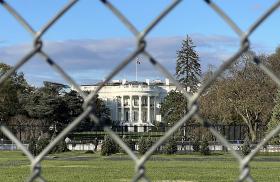
- Policy Analysis
- PolicyWatch 3408
Al-Qaeda’s External Operations One Year After the Pensacola Attack

Drone campaigns have greatly culled the group’s leadership, but leaders are replaceable, and the guided-attack model seen in Pensacola could be a significant force multiplier for any locally rooted affiliates who seek to strike abroad in the coming years.
One year after a shooting attack at Naval Air Station Pensacola by a gunman acting on behalf of al-Qaeda in the Arabian Peninsula (AQAP), the broader al-Qaeda network continues to pursue external operations against Western targets. To be sure, AQ is a more manageable problem today than it was two decades ago after the 9/11 attacks—its branches now focus more on regional insurgencies and local governance projects, while drone campaigns and special forces operations against senior leaders continue to constrain their operations. This reality, which has accelerated in the past decade, illustrates the success of a narrower counterterrorism focus compared to the failures of the invasion/nation-building approach seen in previous years.
Yet claiming that AQ is a “shadow of its former self” or “on the ropes”—which U.S. officials have done repeatedly over multiple administrations—is not a useful attitude considering the network’s ever-evolving nature. As former National Counterterrorism Center chief Russell Travers warned in November 2019, AQ “retains a command structure and half a dozen affiliates, and we see growing connections and coordination between and among its affiliates.” The Pentagon has likewise warned that AQ’s interest in attacking the United States and other Western targets “persists.” Indeed, the Pensacola incident made abundantly clear that despite Washington’s many successes in deterring and foiling plots on American soil, the AQ threat is not one that policymakers can afford to downplay.
WHAT PENSACOLA TAUGHT US ABOUT AL-QAEDA’S OPERATIONS
On December 6, 2019, Mohammed Saeed Alshamrani, a Royal Saudi Air Force officer participating in a Pentagon-sponsored training program, opened fire at Naval Air Station Pensacola in the Florida Panhandle, killing three people and injuring eight others. Two months later, AQAP leader Qassim al-Raimi released a video taking credit for the attack. The video included a martyrdom notice that Alshamrani had written on his iPhone Notes app and sent to AQAP’s leadership.
This was AQAP’s first claimed attack outside its Yemeni home turf since a January 2015 massacre at the Paris headquarters of the satirical magazine Charlie Hebdo. Unlike the Paris attack, the Pensacola shooting was “guided” by AQAP rather than “directed”—that is, the Charlie Hebdo perpetrators had been to Yemen and trained with AQAP prior to their attack, while Alshamrani was only in contact with the group by phone, through which he received assurances and advice. This type of guided attack has been used more proficiently by the Islamic State (IS) over the past five years, but if AQ and its branches invest additional resources in such plots, they might be able to restore their notoriety for external operations after being eclipsed on that front by IS.
LOCAL FOCUS, BUT THE AIM IS STILL GLOBAL
Compared to the period stretching from the late 1990s to the mid-2000s, AQ is now more focused on launching insurgencies and local governance projects in the Muslim world than planning attacks in the West. This is due to the movement’s internal evolution and the greater opportunities it has had to achieve its ultimate goal: create an Islamic state based on its interpretation of sharia.
The latter point highlights the multilayered challenge that AQ and its branches pose today. The network is more than just a terrorism problem—it also presents an acute security challenge to the stability of countries dealing with persistent conflict. AQ and its branches now compete with national authorities on governance and related issues, especially in Mali and Somalia, but also potentially in Afghanistan if the United States withdraws its troops (notably, AQ is said to have coached the Taliban in its most recent negotiations with Washington). Policies aimed at ameliorating insurgencies and countering jihadist governance projects require different solutions than preventing potential attacks against Western interests or territory. If U.S. officials fail to understand this distinction, AQ will have a never-ending bench of new operatives capable of replacing those killed by drone campaigns.
This misunderstanding is also rooted in the fact that IS terrorist activity against the West has spiked in recent years amid a dearth of similar international attacks by AQ, leading governments to rightly focus on IS. But the AQ external operations threat is not always about plots against U.S. or European soil—for instance, AQ branches have continued to conduct major attacks in the Sahel (by Jamaat Nusrat al-Islam wal-Muslimin) and the Horn of Africa (by al-Shabab), killing civilians in hotels and malls as well as security officials at local bases.
In addition to AQAP in Yemen, two AQ branches have shown the most prominent interest in external operations over the past few years: the Somali group al-Shabab and the Syrian group Huras al-Din (along with its predecessor, the so-called “Khorasan Group,” which was embedded in the former AQ branch Jabhat al-Nusra). After Huras al-Din was founded in February 2018, its members primarily focused on fighting the Syrian regime, but many of its original leaders were part of AQ’s historical network and therefore maintain a keen interest in attacking the United States. That is why the Pentagon used a special hotline to reach out to Russian commanders in Syria this summer, requesting that U.S. Special Forces be permitted to carry out airstrikes against local al-Qaeda leaders without interference. Similarly, the U.S. military continues to conduct drone strikes against al-Shabab operatives in Somalia due in part to the group’s expanded targeting of Americans in the region and beyond.
Meanwhile, AQ continues to seek new sources of financial support that could enhance its ability to strike the West. In October, the U.S. Treasury Department’s Office of Foreign Assets Control designated Ahmed Luqman Talib, an Australia-based gem trader allegedly involved in “operational and facilitation activities on behalf of al-Qaeda-linked groups.”
LOOKING AHEAD
The U.S. drone campaign against the AQ network has been particularly successful in 2020—among those killed were top AQ figures Abu Muhammad al-Masri and Husam Abd al-Rauf as well as the leaders of AQAP (Qassim al-Raimi), al-Qaeda in the Islamic Maghreb (Abdelmalek Droukdel), and Huras al-Din (Khaled al-Aruri). Such dramatic turnover at the top could create wider instability in the network’s leadership structure, especially since communications among senior leaders have been less efficient for years due to security concerns stemming from drone campaigns. But if the past is any indicator, AQ will likely sort these issues out, and new individuals will crop up to take the banner forward.
The question is, will these new leaders continue AQ’s greater focus on regional/local conflicts, or will they redirect more resources toward global operations planning? The former scenario is more likely—it has been bearing fruit in recent years as AQ branches grow roots in a number of locales. Yet the guided-attack model seen in Pensacola could be a force multiplier for AQ in a way that was not possible until the past few years, thanks in part to more readily available encryption technology that helps operatives communicate with less risk of detection in certain circumstances.
That is why Washington should build on its recent successes against AQ’s leadership rather than easing the pressure. It should also work with its partners on more sustainable solutions to the many regional conflicts that still provide space for terrorist groups to operate and develop. Military solutions have clearly helped curtail AQ’s external operations over the past decade, but this approach has been far more limited in countering jihadist-led insurgencies and governance efforts. Although addressing local problems related to poor governance, corruption, lack of opportunity, human rights abuses, and climate degradation will not completely eliminate the grievances that AQ is able to exploit, such efforts could reduce the network’s appeal to the many people who see it as an alternative to a broken status quo.
Matthew Levitt is the Fromer-Wexler Fellow and director of the Reinhard Program on Counterterrorism and Intelligence at The Washington Institute. Aaron Zelin is the Institute’s Richard Borow Fellow.




